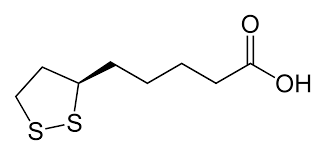Alpha-lipoid acid (ALA), not to be confused with alpha-linolenic acid (ALA), is a potent fat-soluble antioxidant that has been shown to regenerate other antioxidants, such as glutathione, vitamin E and vitamin C. In other words, it reduces oxidative stress and prevents advanced-glycation end-products (AGEs).
![]()
It is known as the “universal antioxidant” and has been used for decades in Europe to treat nerve conditions. Alpha-lipoic acid has been shown to enhance glucose uptake in skeletal muscle tissue, thus improving glucose regulation in people with diabetes mellitus. It has been shown to stimulate glucose transport more effectively than the anti-diabetes medications, glyburide and metformin. It has also been shown to be effective in the treatment of peripheral neuropathy, a common complication in diabetes.
![]()
A deficiency of ALA has also been linked to a reduction in muscle mass, athersclerosis, Alzheimer’s disease, failure to thrive, brain atrophy, and high lactic acid levels.
Even though this nutrient may be in a supplement that is being provided in an over-the-counter product, is it the proper dose and the correct form?
![]()
Currently, there is a lack of consensus on dosage, dose frequency, form of administration, and/or preferred form of ALA, but dose range is from 100 to 1800 mg/day. For improved blood sugar control, 300-1800 mg of ALA has been taken by mouth daily, but most studies have used doses of 600 mg per day, with even 300 mg per day showing improvements in insulin sensitivity. Other studies show 800-1600 mg as providing effective results, and thus less may be of no use. The key is to find an individual’s effective dose through testing and routine monitoring.
![]()
Allergies: Avoid in people with allergies or sensitivities to ALA
![]()
Potential Side Effects & Warnings: may increase risk of bleeding; caution is advised in people with bleeding disorders or those taking drugs that may increase the risk of bleeding; a dose adjustment may be needed; may cause low blood pressure; caution if taking other drugs or herbs that lower blood pressure; may interact with iron and some medications, such as antacids and decrease the effectiveness of some anticancer drugs; other possible side effects are headache, skin rash and stomach upset.
![]()
Food sources of ALA: spinach, broccoli, beef, Brewer’s yeast, some organ meats
![]()
GET Tested to assess your micronutrient status and if supplementation is indicated, take only pharmaceutical-grade products to improve your status. Make sure you are followed by a knowledgeable healthcare professional in this field who understands the relationship between micronutrients, the potential risk and side effects of over- or under-supplementation and interactions with other nutrients and medications. Do not go it alone!
https://drcherylwinter.com/product/micronutrient-testing-profile-package/
So much illness, fatigue, allergy symptoms, and lack of energy today is related to poor nutritional status, despite having an adequate diet and taking over-the-counter nutritional supplements. How is your diet? Let DiabeteSteps Rx® get your nutritional status up to par. After all, this is your one and only body. Where are you going to live when the batteries die?








